| Listing 1 - 10 of 26 | << page >> |
Sort by
|
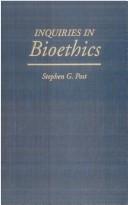
ISBN: 0878405380 0878405399 Year: 1993 Publisher: Washington Georgetown university press
Abstract | Keywords | Export | Availability | Bookmark
 Loading...
Loading...Choose an application
- Reference Manager
- EndNote
- RefWorks (Direct export to RefWorks)
Biologie humaine -- Morale et aspects éthiques --- Biomedical ethics --- Biomedische ethiek --- Biomédecine -- Morale et aspects éthiques --- Deontologie [Medische ] --- Deontology [Medical ] --- Déontologie médicale --- Ethics [Medical ] --- Ethiek [Medische ] --- Ethique médicale --- Medical care -- Moral and ethical aspects --- Medical deontology --- Medical ethics --- Medicine -- Moral and ethical aspects --- Medische deontologie --- Medische ethiek --- Morale et médecine --- Morale médicale --- Médecine -- Innovations -- Morale et aspects éthiques --- Médecine -- Morale et aspects éthiques --- Médecine et morale --- Politique sanitaire -- Morale et aspects éthiques --- Soins médicaux -- Morale et aspects éthiques --- Éthique clinique --- Bioethics --- #GBIB:CBMER --- bio-ethiek (medische, biomedische ethiek, bio-ethische aspecten) --- aids (HIV) --- dier (rechten) --- bioéthique (éthique médicale, biomédicale, aspects bioéthiques) --- sida (VIH) --- animal (droits) --- Ethique médicale --- Clinical ethics --- Ethics, Medical --- Health care ethics --- Medical care --- Medicine --- Professional ethics --- Nursing ethics --- Social medicine --- Moral and ethical aspects --- Bioethics.
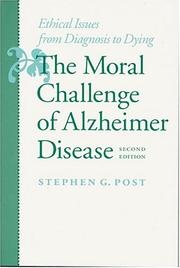
ISBN: 0801864097 0801864100 Year: 2000 Publisher: Baltimore Johns Hopkins university press
Abstract | Keywords | Export | Availability | Bookmark
 Loading...
Loading...Choose an application
- Reference Manager
- EndNote
- RefWorks (Direct export to RefWorks)
Society today, writes Stephen Post, is "hypercognitive": it places inordinate emphasis on people's powers of rational thinking and memory. Thus, Alzheimer disease and other dementias, which over an extended period incrementally rob patients of exactly those functions, raise many dilemmas. How are we to view-and value-persons deprived of what some consider the most important human capacities? In the second edition of The Moral Challenge of Alzheimer Disease, Post updates his highly praised account of the major ethical issues relating to dementia care. With chapters organized to follow the progression from mild to severe and then terminal stages of dementia, Post discusses topics including the experience of dementia, family caregiving, genetic testing for Alzheimer disease, quality of life, and assisted suicide and euthanasia. New to this edition are sections dealing with end-of-life issues (especially artificial nutrition and hydration), the emerging cognitive-enhancing drugs, distributive justice, spirituality, and hospice, as well as a critique of rationalistic definitions of personhood.The last chapter is a new summary of practical solutions useful to family members and professionals.
Health Personnel --- Dementia --- Suicide --- Ethics --- Euthanasia, Active --- Social Sciences --- Diagnostic Techniques and Procedures --- Life --- Behavior and Behavior Mechanisms --- Persons --- Ethics, Clinical --- Adult --- Health Services --- Therapeutics --- Genetic Techniques --- Psychology, Social --- Genetic Services --- Religion and Psychology --- Diagnostic Services --- Nutrition Therapy --- Tauopathies --- Homicide --- Delirium, Dementia, Amnestic, Cognitive Disorders --- Investigative Techniques --- Named Groups --- Psychiatry and Psychology --- Social Problems --- Anthropology, Education, Sociology and Social Phenomena --- Analytical, Diagnostic and Therapeutic Techniques and Equipment --- Occupational Groups --- Religion --- Age Groups --- Neurodegenerative Diseases --- Humanities --- Diagnosis --- Philosophy --- Ethics, Professional --- Brain Diseases --- Preventive Health Services --- Psychological Phenomena and Processes --- Self-Injurious Behavior --- Health Care Facilities, Manpower, and Services --- Sociology --- Nervous System Diseases --- Behavioral Symptoms --- Health Care --- Central Nervous System Diseases --- Community Health Services --- Mental Disorders --- Behavior --- Health Care Quality, Access, and Evaluation --- Diseases --- Genetic Testing --- Morals --- Quality of Life --- Caregivers --- Euthanasia, Active, Voluntary --- Nutritional Support --- Spirituality --- Suicide, Assisted --- Personhood --- Alzheimer Disease --- Emotions --- Patient Care --- Terminal Care --- Aged --- Euthanasia --- Ethics, Medical --- Hospice Care --- Psychiatry --- Health & Biological Sciences --- Psychiatric Disorders, Individual --- Alzheimer --- dementie (Alzheimer, ouderdomsdementie) --- euthanasie (hulp bij zelfdoding) --- levenseinde (einde van het leven, levenseindebeslissing) --- spiritualiteit --- démence --- euthanasie (suicide assistée) --- fin de vie (décision de fin de vie) --- spiritualité --- Alzheimer's disease --- Moral and ethical aspects. --- Alzheimer disease --- Alzheimer's dementia --- Basal ganglia --- Presenile dementia --- Senile dementia --- Moral and ethical aspects
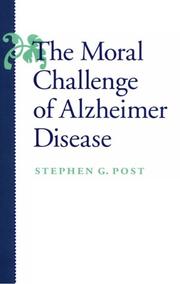
ISBN: 0801851742 9780801851742 Year: 1995 Publisher: Baltimore (Md.) : Johns Hopkins university press,
Abstract | Keywords | Export | Availability | Bookmark
 Loading...
Loading...Choose an application
- Reference Manager
- EndNote
- RefWorks (Direct export to RefWorks)
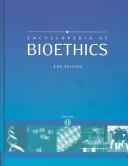
ISBN: 0028657748 0028657756 0028657764 0028657772 0028657780 0028657799 Year: 2004 Publisher: New York Macmillan Reference USA
Abstract | Keywords | Export | Availability | Bookmark
 Loading...
Loading...Choose an application
- Reference Manager
- EndNote
- RefWorks (Direct export to RefWorks)
Bioethics --- Medical ethics --- Bioéthique --- Ethique médicale --- Encyclopedias --- Encyclopédies --- #GBIB:CBMER --- Biomedical ethics --- Clinical ethics --- Ethics, Medical --- Health care ethics --- Medical care --- Medicine --- Professional ethics --- Nursing ethics --- Social medicine --- Biology --- Life sciences --- Life sciences ethics --- Science --- Moral and ethical aspects

ISBN: 0801870151 9780801870156 0801864097 9780801864094 0801864100 9780801864100 Year: 2000 Publisher: Baltimore, Md. Johns Hopkins University Press
Abstract | Keywords | Export | Availability | Bookmark
 Loading...
Loading...Choose an application
- Reference Manager
- EndNote
- RefWorks (Direct export to RefWorks)
Alzheimer's disease --- Alzheimer disease --- Alzheimer's dementia --- Basal ganglia --- Presenile dementia --- Senile dementia --- Moral and ethical aspects. --- Diseases
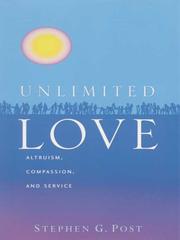
ISBN: 1283260824 9786613260826 193203157X 9781932031577 1599470225 9781599470221 1932031316 9781932031317 9781283260824 6613260827 Year: 2003 Publisher: Philadelphia : Templeton Foundation Press,
Abstract | Keywords | Export | Availability | Bookmark
 Loading...
Loading...Choose an application
- Reference Manager
- EndNote
- RefWorks (Direct export to RefWorks)
What if we could prove that love heals mental illness and is vital to successful therapeutic outcomes in all areas of health care? What if we could prove that people who live more for others than for self have greater psychological well-being?In Unlimited Love, Post examines the question of what we mean by ""unlimited love""; his focus is not on ""falling"" into love, which is ""altogether natural, easy, and delusional."" Rather, he focuses on the difficult learned ascent that ""begins with insight into the need for tolerance of ubiquitous imperfection, and matures in
Altruism. --- Love. --- Affection --- Emotions --- First loves --- Friendship --- Intimacy (Psychology) --- Altruistic behavior --- Unselfishness --- Conduct of life --- Helping behavior
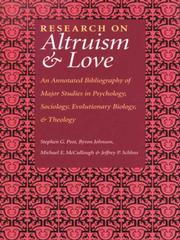
ISBN: 1283260832 9786613260833 193203160X 9781932031607 1599470160 9781599470160 Year: 2003 Publisher: Philadelphia : Templeton Foundation Press,
Abstract | Keywords | Export | Availability | Bookmark
 Loading...
Loading...Choose an application
- Reference Manager
- EndNote
- RefWorks (Direct export to RefWorks)
Research on Altruism and Love is a compendium of annotated bibliographies reviewing literature and research studies on the nature of love. An essay introduces each of the annotated bibliographies.A variety of literature either directly related to science-and-love issues or supporting literature for those issues is covered in the Religious Love Interfaces with Science section. This annotated bibliography is unique in that it approaches the field from a decidedly religious perspective. It includes classical expositions of love that continue to influence contemporary s
Altruism --- Love --- Affection --- Emotions --- First loves --- Friendship --- Intimacy (Psychology) --- Altruistic behavior --- Unselfishness --- Conduct of life --- Helping behavior
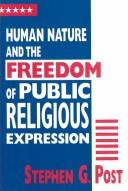
ISBN: 0268030626 Year: 2003 Publisher: Notre Dame University of Notre Dame press
Abstract | Keywords | Export | Availability | Bookmark
 Loading...
Loading...Choose an application
- Reference Manager
- EndNote
- RefWorks (Direct export to RefWorks)
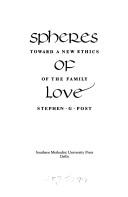
ISBN: 0870743716 Year: 1994 Publisher: Dallas Southern methodist university press
Abstract | Keywords | Export | Availability | Bookmark
 Loading...
Loading...Choose an application
- Reference Manager
- EndNote
- RefWorks (Direct export to RefWorks)
Families --- Families --- Love --- Moral and ethical aspects --- Religious life --- Religious aspects --- Christianity
Book
ISBN: 1283260301 9786613260307 1599471930 9781599471938 9781283260305 6613260304 9781599471518 1599471515 Year: 2008 Publisher: West Conshohocken, Pa. Templeton Foundation Press
Abstract | Keywords | Export | Availability | Bookmark
 Loading...
Loading...Choose an application
- Reference Manager
- EndNote
- RefWorks (Direct export to RefWorks)
In this uplifting new book, author Stephen G. Post explores the mysteries and the wonder of Godly love-the all important love that is at once personal, unconditional, unlimited, generative, and omnipresent. The title alludes to Isaiah 35, to the way in which Godly love is said to plant a rose in our hearts precisely when we feel most like a dry desert with no more love of our own to give.Post draws on his own life experiences as well as his work at the Institute for Research on Unlimited Love, as he intersperses personal anecdotes with spiritual truths and research on human happ
| Listing 1 - 10 of 26 | << page >> |
Sort by
|

 Search
Search Feedback
Feedback About UniCat
About UniCat  Help
Help News
News